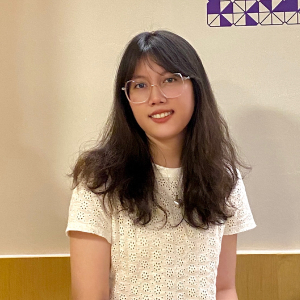Food Engineering and Bioprocess Technology (FEBT)
Master Degree

Free consultation for this program
We are ready to help you with your difficulties and processing.
Duration
2 years
Study Format
On Campus
No. of Student Mentors
72
Total Tuition Fees
855,600 THB





Free consultation for this program
We are ready to help you with your difficulties and processing.
Duration
2 years
Study Format
On Campus
No. of Student Mentors
72
Total Tuition Fees
855,600 THB





Program
Key information
University
Program structure
Tuition fees
Admissions
Possible Career Pathway
Student's testimonials
F&Qs
ABOUT THIS PROGRAM
Food Engineering and Bioprocess Technology (FEBT) at AIT is a unique program as it combines engineering concepts with bioprocess technology for real-world applications. The program focuses on two major areas of specialization: Food Process Engineering and Bioprocess Technology. Food Process Engineering focuses on the application of engineering principles to the design of postharvest and food processing equipment; changes that may occur within products during handling, processing, and storage; measuring and controlling the quality of raw food materials; food safety; the handling and utilization of wastes generated during on-farm processing. Bioprocess Technology is dedicated to the developments in biotechnology and its applications in agro/food, functional food, biopolymers, dairy and meat science, cosmetics and pharmaceuticals. Industrial bioprocess technology for the conversion of raw agricultural products to useful food products, biomaterials with specific growth-promoting properties are developed for application in organic farming. To strengthen the applicability of microorganisms for specific purposes, courses are given in the genetic engineering of microorganisms. DNA with interesting properties is transferred to produce strains for industrial applications. Students spend the first year with relevant courses as listed below and the final year with a thesis based on pure research according to their interests.
FOCUS AREAS
- Food Engineering
- Postharvest Technology
- Novel Food Processing Technologies
- Chemical Sensors, Biosensors and Sensing Technology for Food Safety Application
- Innovative and Sustainable Packaging Systems
- Biotransformation of Agro-industrial Waste and Value Additions
- Molecular Biotechnology and Food Safety
- Advance Bioprocessing and Tissue Culture
- Nanobiotechnology
- Microbial Physiology and Metabolic Engineering.
KEY INFORMATION
Degree
Master
Language
English
Location
Thailand
Intake Start Date
Jan 2026
Study Format
On Campus
Duration
2 years
Program Highlight
Standard Program
Total Semester
4
Total Tuition Fees
855,600 THB / in total
Application deadline
Jul 2026
ABOUT UNIVERSITY

Asian Institute of Technology, 58 Moo 9, Km. 42, Paholyothin Highway, Klong Luang, Pathumthani 12120, Thailand, Khlong Nueng, Pathum Thani 12120 Thailand
Asia Ranking 2026
EduRank Ranking 426
Programs
91
Students
Not Provided Yet
The Asian Institute of Technology (AIT) is an international English-speaking postgraduate institution, focusing on engineering, sustainability, and management studies. AIT’s rigorous academic, research, and experiential outreach programs prepare graduates for professional success and leadership roles in Asia and beyond.
Founded in 1959, AIT offers the opportunity to study at an institution in Asia which possesses a global reputation. Going forward, AIT will be stressing its global connections, injection of innovation into research and teaching, its relevance to industry, and its nurturing of entrepreneurship, while continuing to fulfill its social impact and capacity building role. Sitting on a beautiful green campus located just north of Bangkok, Thailand, AIT operates as a multicultural community where a cosmopolitan approach to living and learning is the rule. You will meet and study with people from all around the world.
Today, AIT’s internationally recognized engineering, environment, and management graduates are highly sought after by employers in their home countryand elsewhere. Across many walks of life in Asia, AIT alumni have distinguished themselves as CEO’s of private and state enterprises, as business owners, as well-respected researchers and faculty, and as senior university and government officials.
See more
PROGRAM STRUCTURE
COURSE STRUCTURE
Course Code Course Number of Credits Description/Course Objective Semester
ED73.01 Food Process Engineering 3
To provide students with engineering principles in food processing operations and technologies to enhance the quality, safety and sustainable processing of foods.(Aug Sem)
ED73.02 Postharvest Engineering 3
To impart knowledge on pre and postharvest engineering practices necessary to minimize the postharvest losses in cereals, horticultural crops and ensure the safety and quality of processed food. (Aug Sem)
ED73.03 Bioprocess Technology 3
To provide the students with current concepts and the basic principles for the quantitative analysis of biotechnology and its applications in the food, feed, environmental and pharmaceutical industries. (Aug Sem)
ED73.04 Bioreactor Design and Control 3
To impart knowledge on different configurations of bioreactors, optimization and fermentation process control, which are required for novel bioprocess applications such as in food, environment, pharmaceutics and tissue culture systems. (Aug Sem)
ED73.06 Food Engineering Operations 3
To equip students with the basic scientific knowledge of food manufacturing and its link with food engineering operations by emphasizing on the principles and design of the systems for food processing and preservation. (Jan Sem)
ED73.08 Numerial Computations in Food Process Engineering 3
To introduce students important numerical methods which can be applied to solve a wide variety of problems in food process engineering. (Jan Sem)
ED73.09 Engineering Properties of Food Materials 3
To provide knowledge on the principles involved in the measurement of physical characteristics, mechanical, thermal, electrical, and optical properties of food materials. Students also learn the analysis, interpretation and application of experimental data in relation to handling, processing, storage and quality evaluation of foods. (Jan Sem)
ED73.10 Food Process Engineering Laboratory 3
To train students with the practical engineering aspects of the processes and equipments used for handling, processing, and distribution of food materials and products. (Aug Sem)
ED73.11 Bioseparation Processes 3
To develop ability of students to analyze and design the separation and purification of bio-molecules. (Jan Sem)
ED73.12 Advanced Bioprocess Technology Applications 3
To impart knowledge on new and efficient biotechnological methods for wide range of applications in food and agriculture, health care and environment management. (Jan Sem)
ED73.13 Bioprocess Practica 3
To familiarize and provide practical experiences on microbiology, genetic engineering and biochemistry. (Jan Sem)
ED73.15 Processing Effects on Functional Components of Foods 3
To provide knowledge on the molecular interactions of components and their effects on processing, nutritional attributes in complex food systems. (Aug Sem)
ED73.16 Sustainable and Safer Food Processing 3
To impart knowledge on the modern concepts of sustainability and safety applied in food conversion. Understanding the entire product life cycle and its carbon footprint is a key to improve product quality and to enhance industrial production of food and biomaterials. This course provides the theoretical basis of sustainability and its application in various food processing operations. (Jan Sem)
ED73.17 Industrial Microbiology 3
To develop the students’ ability to apply the techniques used in the different phases of applied microbiology including principles and practices in the industrial production of foods, pure chemicals, proteins and other useful products. (Aug Sem)
ED73.18 Enzyme and DNA Technology 3
To provide knowledge on the concepts and techniques of DNA technology in a rapidly developing field. As well as, this course deals with the enzymes that enable the cells to produce variety of compounds and the molecular properties of cellular genetic materials. (Aug Sem)
ED73.9001 Selected Topic: Dairy and Meat Biotechnology 3
Overview and concern on food security and food production; Role of agricultural and animal biotechnology in food production; Advanced technology in farm animal production for enhanced productivity and in role of poverty alleviation; Chemistry and biochemistry of dairy and meat processing; dairy and meat technology; safety of dairy and meat products. (Jan Sem)
ED73.9003 Selected Topic: Innovations in Safety and Quality in Food Production Systems 4
To provide the students with knowledge on the need for greater quality assurance, and standardization in the food production systems. The course emphasizes food quality control as the mechanism for the prevention of food-borne illness and food spoilage at the “farm-to-fork” level. (Aug Sem)
ED73.9004 Selected Topic: Methods in Bioprocessing and Molecular Biology 2
To familiarize and provide practical experiences on microbiology, bioprocessing, genetic engineering and biochemistry. (Jan Sem)
ED73.9005 Selected Topic: Molecular Nutrition, Food Toxicology and Health 3
To provide knowledge on the molecular interactions of components and their effects on processing, formation of toxic compounds and nutritional attributes in complex food systems and their effects on human health. (Jan Sem)
Minor details: The offer of “Minor” in “Food Engineering and Bioprocess Technology”, FAB Department will be in with the following courses
Course code Course title Credit Semester
ED73.01 Food Process Engineering 3(3-0) August
ED73.03 Bioprocess Technology 3(3-0) August
ED73.10 Food Process Engineering Laboratory 3(1-6) August
ED73.13 Bioprocess Practica 3(1-6) January
TUITION FEES
Tuition fees
855,600 THB / in total
Application fees
800 THB
Application fee cannot be refunded.
Get a Free Consultation!
Not sure where to start with your application?
Our student ambassadors can walk you through the admission process, step by step.
ADMISSIONS PROCESS

- Hold a Bachelor’s degree (normally from a four-year program), or its equivalent, in an appropriate field of study from an institution of good standing acceptable to AIT;
- Have undergraduate grades significantly above average; the minimum cGPA requirement for admission to the Master’s Program is 2.75 or equivalent, at the Bachelor’s degree level;
- English Proficiency Requirement: AIT-EET: 6; IELTS Academic: overall 6 (writing 6); TOEFL iBT: overall 80 (writing 21-23); & PTE Academic: overall 52 (writing 62-73)
- Be in satisfactory physical and mental health, and have a record of good conduct;
For the Professional Master’s (PM) degree program, in addition to the above-mentioned eligibility requirements, an applicant must:
- Have at least 3 years of work experience in areas related to the academic program at AIT and
- Be executives in organizations/companies.
PREFERRED BACKGROUND
- Science in Microbiology
- Science in Animal Produce Food Safety
- Pharmacy
- Science in Agriculture
- Food Science and Technology
- Food Technology
- Science in Food Safety
- Biotechnology ,Food science ,Food management, Food and nutrition, Nutrition science
Possible Career Pathway
A career in Food Engineering and Bioprocess Technology (FEBT) can lead to diverse opportunities in industries such as food production, biotechnology, pharmaceuticals, and environmental management. Graduates can work as food process engineers, bioprocess engineers, quality assurance specialists, or research and development scientists. They may focus on designing and optimizing food processing systems, developing sustainable and safe food production methods, or innovating in biotechnology applications such as enzyme technology and bioreactor design. Additionally, roles in academia, regulatory bodies, or consulting firms are also viable pathways, emphasizing the versatility and demand for expertise in these fields.
STUDENT's TESTIMONIALS
No testimonials available just yet — stay tuned!
FAQs
Question :
Can I apply to two Academic Programs at the same time?
Answer :
No. You can only apply to one academic program at any time.
Question :
Do you have academic exchange programs and scholarships for those?
Answer :
2 Year Master’s Degree students normally study for 22 months (enrolled in August Intake) and 24 months (enrolled in January Intake) which includes four semesters, two short breaks and one long break between semesters. Doctoral students study for at least 42 months or seven semesters. 1-year Master, Professional Master Program and the Diploma Programs are at least 12 months or two semesters and the Certificate Program is 5 months or one semester.
Question :
What are Unified programs?
Answer :
Unified Programs integrate undergraduate studies with graduate studies into a seamless “Unified” program. For example, undergraduate students may join AIT in their final year to complete their undergraduate degree and at the same time start their Master program at AIT. AIT has several Unified programs with partner universities managed by Office of Special Degree Program.
Question :
What is the AIT English Entry Test (AIT-EET)?
Answer :
The Language Center (LC) offers a 90-minute in-house test of English proficiency called the AIT English Entry Test (EET). The score is based on a nine-point scale similar to the IELTS test. The Writing score, which is the most important at AIT, is based on an essay. The test result will be e-mailed within 7 days. The LC will report the test result to the AIT Admissions only if the score is satisfactory for provisional admission. If applicants fail to obtain the minimum score requirements for admission, they may take the test again.
Question :
Will you waive my admission interviews since I was admitted last year but chose not to register?
Answer :
No. As the application assessment varies from each intake, your application in the next intake must be as competitive as those with others applying in that same intake.
Question :
Do I need to apply for the scholarships listed on the website?
Answer :
You do not need to apply separately for the scholarships. Once you have submitted the application online, your will be automatically considered for all scholarships for which the deadline has not expired and for which you are eligible. The type and amount of scholarship given to applicants is on a competitive basis with the main criteria of academic standing. Should you wish to be considered for full scholarships, you must submit an Official English score of 6 including writing and overall that is not older than 2 years.
Question :
How much is the application processing fee?
Answer :
The processing fee is Baht 800 or US$25.
Question :
If I apply and accepted this intake, can I defer to the next intake with the same condition?
Answer :
Yes, you can defer your entry until the next academic semester. However, the financial conditions of the admission may change depending on the competitive assessment for the next semester. You are also required to pay the application processing fee to reactivate your admission.
Question :
When is the school intake and the application deadline?
Answer :
The AIT academic year consists of two semesters: January and August for School of Engineering and Technology (SET) and School of Environment Resources and Development (SERD).